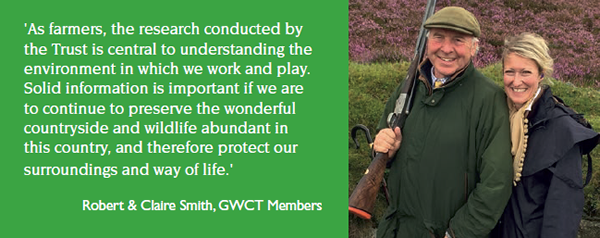The RSPB press office appear to have forgotten that 75% of the world’s heather moorland is found in the UK because grouse moor managers have been fighting to save it - since before the RSPB existed. In 1880 the first moor owner took a city corporation to court for draining peatland to provide drinking water. In this century moor owners have refused subsidy, or tax incentives, from successive governments, which encouraged them to drain their peatlands and carpet them in trees or sheep.
GWCT research showed that between the 1940s and 1980s grouse shooting was the main reason we kept our open moorland. There is also a wider, shared social responsibility that rarely gets aired: pollution from urban areas has significantly damaged the growth of the rare plants protecting the surface of our peatlands for over 100 years.
The main body of people that began large scale efforts to combat this degradation were moor owners. It is bizarre that the RSPB now seek to criticise them through the highly selective use of both science and history. Conservationists are still learning how complex these peatland systems are and moor owners are helping evolve best practice.
Andrew Gilruth
Director of Communications
What do we do?
- We use science to promote game and wildlife management as an essential part of nature conservation.
- We develop scientifically researched game and wildlife management techniques.
- We promote our work to conservationists, including farmers and landowners and offer an on-site advisory service on all aspects of game and wildlife management, so that Britain’s countryside and its wildlife are enhanced for the public benefit.
- We influence government policy with sound science that creates progressive and effective policies.
- We support best practice for field sports that contribute to improving the biodiversity of the countryside.
Donate by Credit or Debit Card >>
Got a PayPal account? Donate faster here:


What do we believe?
- Scientific research should underpin sustainable conservation practice.
- Game and wildlife management is the foundation of good conservation.
- Field sports (in particular shooting and fishing) can contribute substantially to the conservation of landscape, habitat and wildlife.
- Humane and targeted predator control is an essential part of effective game and wildlife conservation.
- We utterly oppose those who engage in wildlife crime.
- Good conservation goes hand-in-hand with economic land use.
How your money is spent
- We spent over £5m on vital game and wildlife research and public education in 2017.
Donate by Credit or Debit Card >>
Got a PayPal account? Donate faster here:
